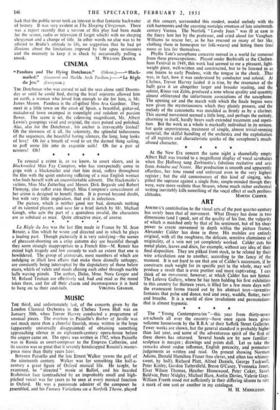MUSIC
THE third, and unfortunately last, of the concerts given by the London Classical Orchestra in the Chelsea Town Hall was on January. 30th, when Trevor Harvey conducted a programme of unusual pieces. The overture to Paisiello's Barber of Seville was not much more than a cheerful flourish, music written in the hope (apparently universally disappointed) of obtaining something approaching silence in an eighteenth-century opera-house before the singers came on. The opera was written in 1782, when Paisiello was in Russia as court-composer to the Empress Catherine, and its success was so great that it severely handicapped Rossini's master- piece more than thirty years later. Between Paisiello and the late Ernest Walket yawns the gulf of the nineteenth century. Walker was for something like half-a- century a great figure of Oxford musical life. He taught, he examined, he " directed " music at Balliol, and his bearded Brahmsian face (contradicted by an improbably small and high- pitched voice) was for years to be seen at every musical function in Oxford. He was a passionate admirer of the composer he resembled, and his Fantasy Variations on a Norfolk Theme, played
at this concert, surrounded this modest, modal melody with the rich harmonies and the yearning nostalgic emotion of late nineteenth- century Vienna. The Norfolk " Lovely Joan " was ill at ease in the finery lent her by the professor, and cried aloud for Vaughan- Williams to rescue her, as he has rescued so many of her like, clothing them in homespun (or folk-weave) and letting them fend more or less for themselves.
Phyllis Tate's saxophone concerto moved in a world far removed from these preoccupations. Played under Barbirolli at the Chelten- ham Festival in 1949, this work had seemed to me a pleasant, light- weight piece, well-written and constructed, but to be listened to as one listens to early Poulenc, with the tongue in the cheek. That was, in fact, how it was understood by conductor and soloist. At Chelsea, Trevor Harvey (aided it is true, by the resonance of the hall) gave it an altogether larger and broader reading, and the soloist, Rinus van Zelm, produced a tone whose quality and quantity almost obliterated the unfortunate associations of the saxophone. The opening air and the march with which the finale begins were now given the mysteriousness which they plainly possess, and the melody of the canzonetta was moulded as firmly as by a clarinet. This second movement seemed a little long, and perhaps the melody, charming in itself, hardly bears such extended treatment and repeti- tion. But the work as a whole is markedly individual in its serious, but quite unportentous, treatment of simple, almost trivial-seeming material, the skilful handling of the orchestra and the exploitation of all registers and characteristic quirks of the saxophone's much- abused character.
*
At the New Era concert the same night a shamefully empty Albert Hall was treated to a magnificent display of vocal acrobatics when Ilse Hollweg sang Zerbinetta's fabulous recitative and aria from Ariadne auf Naxos. Her production is smooth and apparently effortless, her tone round and unforced even in the very highest register ; but the old connoisseurs of this kind of singing, who pitted the soprano against a single flute, simple-minded though they were, were more realistic than Strauss, whose much richer orchestral writing inevitably kills something of the vocal effect at such perilous


































 Previous page
Previous page